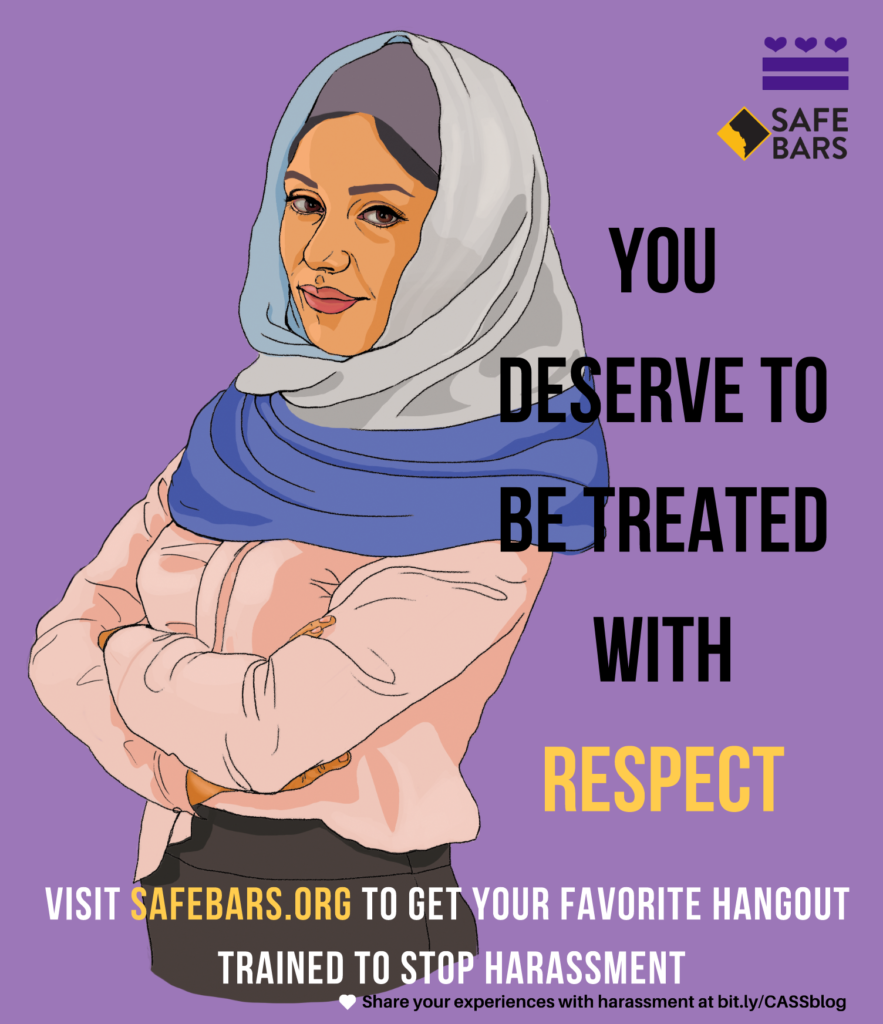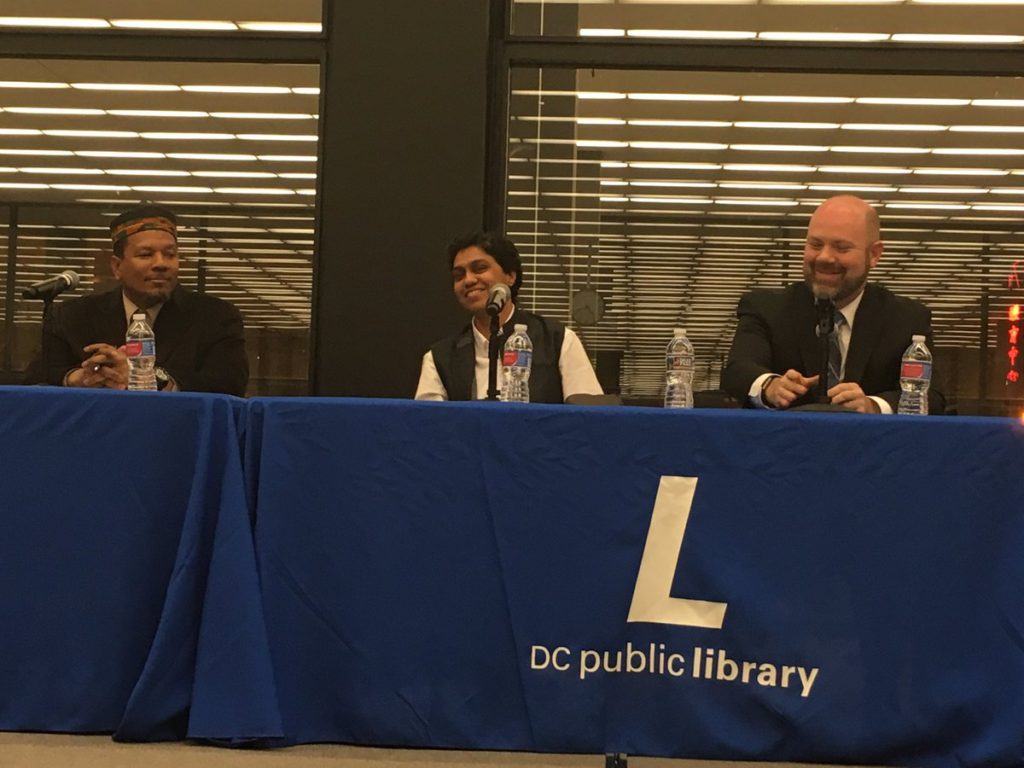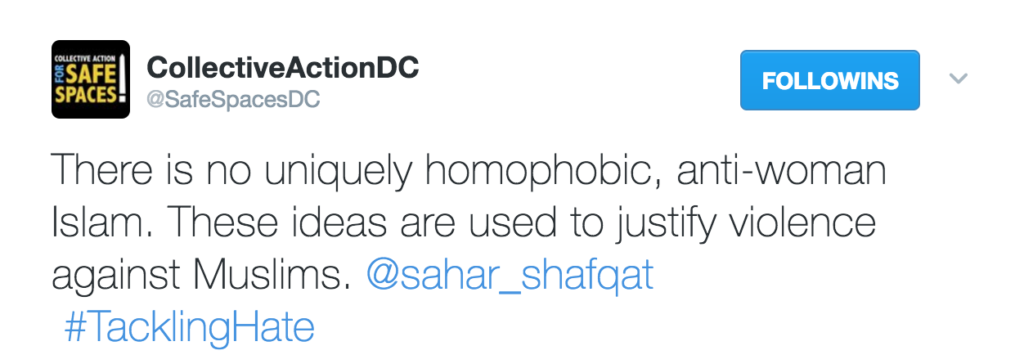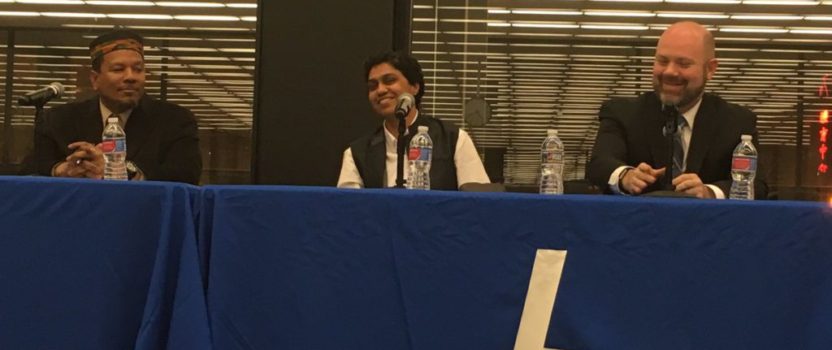Tackling Islamophobia at Home
“2015 was the worst year on record with 78 [anti-mosque] incidents documented,” said Corey Saylor of the Council on American-Islamic Relations (CAIR) at DC Public Library’s recent event, Tackling Islamophobia at Home. When the numbers are totaled, he said, 2016 will top that. Saylor noted, “Each year is becoming more violent.” And new research from the Southern Poverty Law Center shows anti-Muslim hate groups in the country grew by 197% in 2016.
Anti-Muslim rhetoric and policies, including the recently overturned executive order known as the Muslim ban, translates to harassment and violence against people in our communities who are perceived to be Muslim. Policies in particular have led to a rise of law enforcement violence against Muslim communities.
We’ve seen this to be true here in DC in just the last year. Most notably, a Muslim woman at Shaw Library was harassed and threatened by a DC Public Library police officer when she refused to remove her hijab.
I happened to be at Shaw Library that day, sending emails from a library computer with my then-two year old on my lap when I saw Officer Craggette approach a woman who was reading quietly. Reaching for his handcuffs to intimidate her, he said that if she didn’t take off her hijab then she had to leave.
Working with Darakshan Raja at the Muslim American Women’s Policy Forum, CASS organized a rally outside Shaw Library. We collaborated with Many Languages One Voice (MLOV) to release recommendations for the library to address the problem at an institutional level, and we reiterated our recommendations at the agency’s budget oversight hearing two weeks later. And with some help from CM Grosso’s office, the library’s leadership took us seriously. In October, DCPL plastered its community boards with posters highlighting the faces of Muslim women and other marginalized community members, sharing resources for reporting harassment and discrimination with the message: “You deserve to be treated with respect.”

Over the next few months, we worked with DCPL to organize the event at MLK Library, Tackling Islamophobia at Home, to raise awareness about the dynamics of Islamophobia and the ways that allies can stand against it. The panel of speakers included Corey Saylor of CAIR, Sahar Shafqat of the Muslim Alliance for Sexual and Gender Diversity (MASGD) and the DC Justice for Muslims Coalition, and Imam Shareef of Masjid Muhammad.

Here are some of the key takeaways:
- Islamophobia is everywhere. Even in our “safe spaces” like the public library. Even in our local progressive LGBT newspapers. Just like sexist comments and racist jokes, we need to call out Islamophobia in all of the ways that it shows up, even if it doesn’t seem severe, because the less severe incidents create an environment that allow for everyday Islamophobia to escalate to anti-Muslim violence. Not sure what to say when someone makes a biased comment in everyday conversation? Try some of these suggestions from our #AllMenCan Twitter chat. And if you see someone being harassed, you can support them by simply asking: “Are you OK?”
- Anti-Muslim violence is on the rise — and institutional violence plays out a lot like interpersonal violence. In interpersonal violence, an aggressor will select their target, usually someone who is more vulnerable in some way, and test to see which behaviors they can get away with before it escalates to something more severe. Similarly, the executive order referred to as the Muslim ban is an aggressive anti-Muslim policy that experts like Saylor refer to as the test. “There’s no way he’s going to go into office and sign legislation or create an executive order that says ‘we’re banning Muslims’ because that simply wouldn’t survive 30 seconds of constitutional challenge,” explained Saylor. “We always said you would probably see it in pieces. And that’s where this executive order comes in: It’s the first part — the test.”
- We’re asking the wrong questions. “Some people have noted that ‘terrorist countries’ aren’t on this list, and some other countries are, but actually no countries should be on this list. There should be no list,” Shafqat pointed out. The questions that came from audience submissions showed that there’s a problem with the way that we think about Islamophobia. We don’t need to learn more about Islam, read the Quran, or hear stories about acts of kindness by people of Muslim faith to be able to treat Muslims with respect. As Sahar put it, if we’re looking to change people’s perceptions of Islam as a threat, we don’t need to read up on the religion. She says, “There are 1.6 billion Muslims. Surely they can’t all be homogenous and monolithic. Just appeal to your common sense.”

At the end of the day, Muslims are just people like everyone else. And if you’re taking in information from sources that aren’t showing the full spectrum of their humanity, challenge those portrayals. And appeal to your common sense.
Stay tuned for ways you can help us address harassment against marginalized communities in DC, and follow our work as one of the founding members of the DC Justice for Muslims Coalition!

